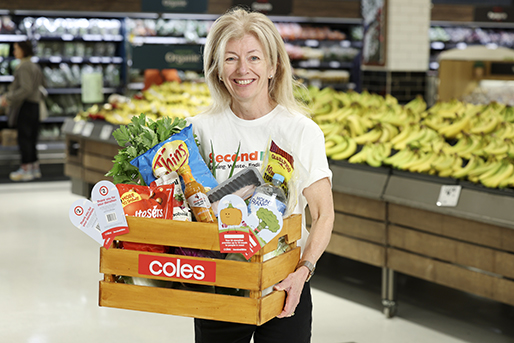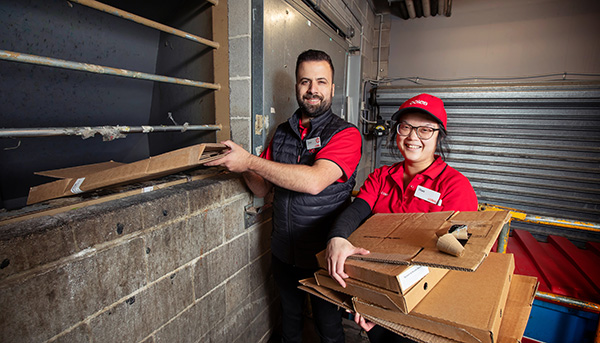Brooke Donnelly, GM Sustainability at Coles Group
Circularity is embedded in our sustainability strategy, which focuses on key areas of climate, nature and circularity. Within these areas, we’re delivering system-wide outcomes through collaboration, innovation, and a shared commitment to change.

Packaging
Packaging plays a vital role in protecting products, extending shelf life, and reducing food waste. But it must be designed with its end-of-life in mind. At Coles, our packaging framework is built on three pillars: redesign, recycle, and reimagine and supported by a team of packaging technologists that are dedicated to driving sustainable packaging outcomes for our Own Brand product portfolio.
In FY24 we completed some key packaging achievements including:
- Removing 13 tonnes of plastic annually by eliminating plastic openings from tissue boxes
- Offering Unique Selection mandarins in a kerbside recyclable paper bag, instead of a traditional plastic net, avoiding over 11.7 tonnes of plastic net bags.
- Selling grapes in kerbside recyclable paper bags in Victoria and Tasmania, avoiding over 68.4 tonnes of plastic bags.
In addition, we also collaborate with organisations like Planet Ark to promote recycling education and support initiatives such as National Recycling Week and the Coles & Planet Ark Sustainable Schools Competition. Coles is also a signatory to the Australian Packaging Covenant Organisation and has been rated a ‘Leading’ retailer by them since 2019.

Waste
Food waste is a global challenge, and in Australia it accounts for around 3% of annual greenhouse gas emissions. At Coles, we’re working to reduce food waste at every stage—from farm to fork.
In FY24, we diverted 86.7% of total solid waste from landfill and donated the equivalent of 39.8 million meals through our partnerships with SecondBite and Foodbank.
We’re also supporting innovative solutions like:
- Black soldier fly farms, where larvae convert food waste into protein and fertiliser in just 12 days.
- Composting partnerships, where unsold food is turned into nutrient-rich compost used to grow crops that return to our shelves.
Our long-standing partnership with SecondBite, which began in 2011, has resulted in the donation of over 258 million meals. When fresh produce is repurposed into frozen meals by FareShare, its shelf life extends from just five days to around one year – maximising value and reducing waste.
We’re working with suppliers to embed circularity into farming and production. Through the Coles Nurture Fund, we’ve awarded $3.5 million in the latest round of grants, to support Australian producers in adopting sustainable and circular practices. Now in its eleventh year, the Coles Nurture Fund has awarded more than $40 million in financial support to 119 Australian producers across a wide range of industries.
Our Sustainable Dairy Development Group is exploring circular feed systems and nutrient recycling on farms. We’re also trialing packaging made from agricultural waste and using recycled water in food processing.
In our stores and supply chain, we’ve implemented:
- Closed-loop cardboard recycling, turning used boxes into new packaging.
- Reverse logistics systems that recover soft plastics, cardboard, and food waste for reuse or recycling.
- Reusable crates and pallets to reduce single-use transport packaging.
Circularity also means reducing our environmental footprint. In FY24, Coles achieved a 34.5% reduction in Scope 1 and 2 emissions compared to FY20.
This effort is supported by energy efficiency upgrades, on-site solar installations, and renewable energy contracts.
We know that circularity can’t be achieved alone. That’s why we work closely with government, industry, and community partners to scale solutions and drive change.
Circularity is not just about reducing waste—it’s about rethinking how we create value. At Coles, we’re proud to be part of the solution, helping to build a more resilient, regenerative future for all Australians.
We know the path forward requires bold thinking, shared responsibility, and a system-wide approach. Together, we can close the loop—and open the door to a more sustainable tomorrow.


